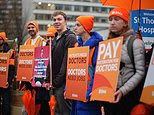
Junior doctors could earn a pension of almost £125,000 for every year of their retirement, according to research.
Resident doctors, as they are now called, who begins working for the NHS at 23 and retire by the age of 65 are capable of having an annual allowance of £124,363 a year, analysis from wealth management firm Quilter found.
The NHS’ ‘generous’ pension scheme pays a guaranteed income in retirement of 1.85 per cent each year, which rises annually with inflation with a further 1.5 per cent.
Those starting postgraduate training, known as foundation year one, this year will start with a basic salary of £38,831.
This rises up to £73,992 for registrars in specialist training, which can last for a number of years before they qualify as a GP, consultant or other senior role.
Within ten years, they will have already earnt a pension entitlement worth £11,906 a year, according to Quilter.
And if they decide to become a consultant and remain in the role until they reach the NHS retirement age, they could supposedly be guaranteed an annual pension of £124,363.
Junior doctors staged a fresh round of strikes earlier this week, demanding a further 26 per cent pay rise on top of the 28.9 per cent already received over the past three years.
Junior doctors could earn a pension of almost £125,000 for every year of their retirement, according to research. Pictured: Striking doctors outside St Thomas’ Hospital on Friday
Wes Streeting (pictured) described the striking doctors as ‘extremely irresponsible’
The cohort of medics in England walked out at 7am on Friday to strike over pay and conditions, which ended on Wednesday.
NHS chief executive Sir James Mackey said at the time the NHS had been operating at 95 per cent during the strikes and there were fewer resident doctors striking than in any of the previous 12 rounds of industrial action.
In a letter to NHS leaders yesterday, Sir James thanked staff for their ‘heroic efforts’ to maintain services. He said the NHS was achieving its goal of delivering at least 95 per cent of planned activity during the period.
‘It’s a genuinely impressive response to everything you’ve had to contend with,’ he wrote.
‘While turnout is variable across the country, there are some really encouraging early indications that there have been fewer resident doctors striking than in any of the previous 12 rounds of industrial action.
‘We mustn’t become complacent and there is some really hard work directly ahead of us – but don’t lose sight of how remarkable the NHS response to all of this has been.’
The five-day action is the 13th walkout by doctors since March 2023, with the last strike in July estimated to have cost the health service £300 million.
Health Secretary Wes Streeting described the striking doctors as ‘extremely irresponsible’ and accused the British Medical Association (BMA) of ‘cartel-like behaviour’.
Mr Streeting told LBC radio that medics were holding patients to ‘ransom’ by walking out during the five-day resident doctors’ strike across England from today.
Health Secretary Wes Streeting during an appearance on LBC radio in London on Friday
Speaking with a doctor, Niraj from Harrow in north-west London, Mr Streeting said doctors should ‘own’ the damage being done to patients by the strike.
He said the walkout is ‘going to set us back’ and also accused BMA ‘activists’ of ‘damaging’ NHS recovery.
Resident doctors make up about half the medical workforce in the NHS and have up to eight years experience working as a hospital doctor or three years as a GP.
The last time they went on strike, more than 54,000 procedures and appointments needed to be cancelled or rescheduled, despite the NHS maintaining 93 per cent of planned activity.
On Friday, the BMA agreed to a derogation – where resident doctors are asked to leave the strike and work when patient safety is at risk – for maternity services in Nottingham.
Residents working on the labour ward at Queen’s Medical Centre and City Hospital were derogated for shifts on Friday, Saturday and Sunday.
Responding to the analysis, commissioned by The Times, Dr Vishal Sharma, chair of the BMA pensions committee, said: ‘This highly misleading and implausible modelling is based on improbable assumptions such as a resident doctor always working full time for 43 years when the simple truth is that given the physical and mental demands of a career in medicine, many do not and the modelling is simply not credible given the changes many will make to their working patterns, maternity leave and to provide childcare for example.
‘Moreover it simply does not align with the real careers in medicine for many resident doctors and when they currently retire, and is a huge distraction from the real issue of how many resident doctors are facing an uncertain future due to the lack of training posts for them and the fact that high levels of stress and burnout, linked to the pressures of working in an understaffed and underfunded health service, mean many reduce their working hours or leave the NHS altogether.’





